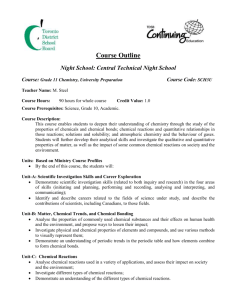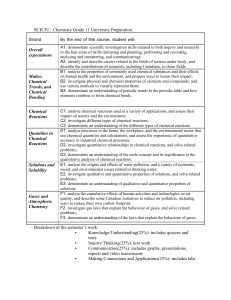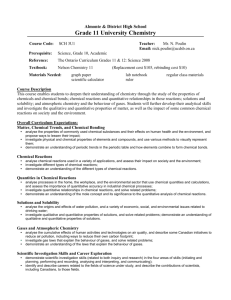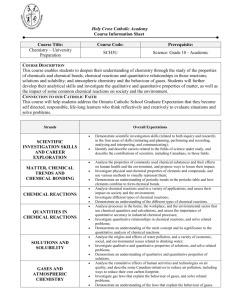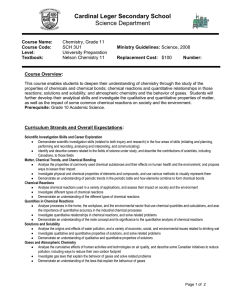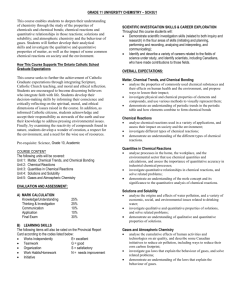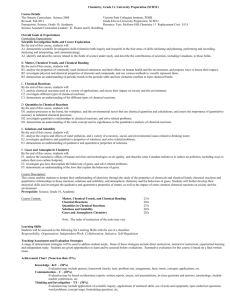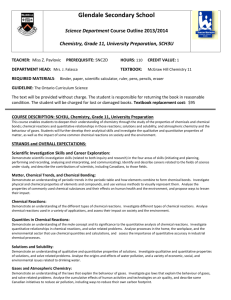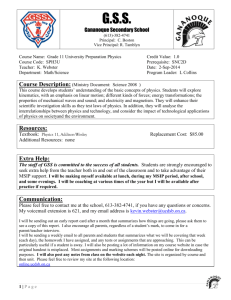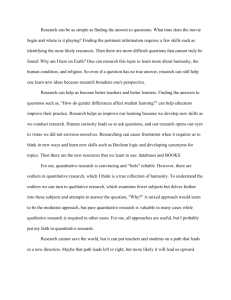Course Information Sheet
advertisement
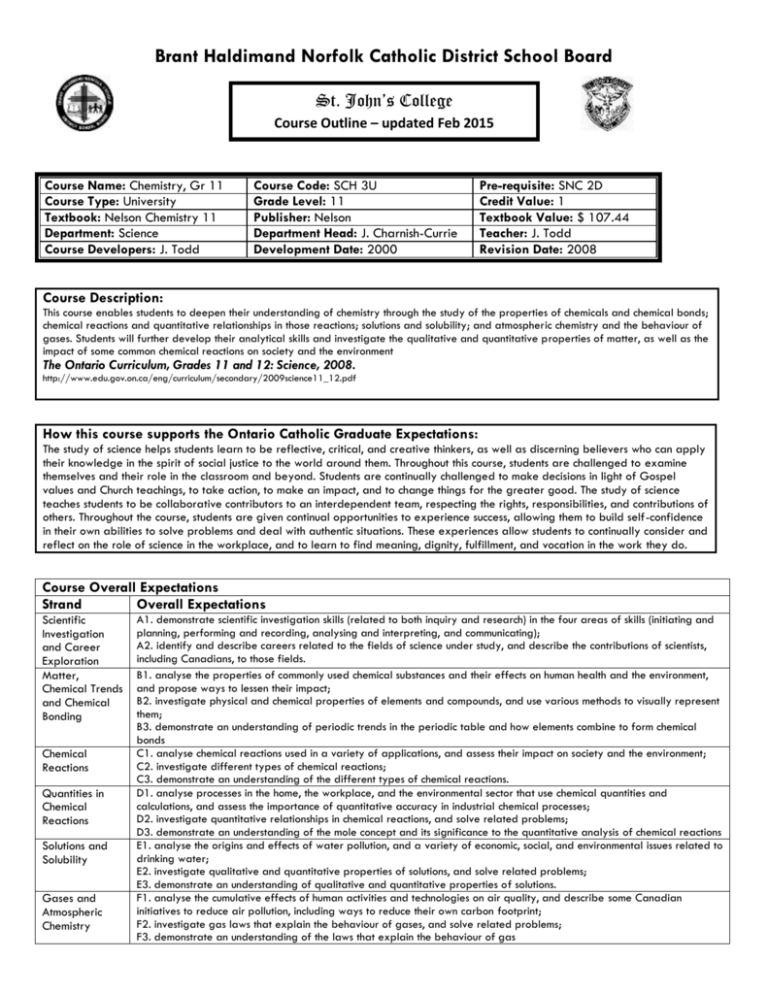
Brant Haldimand Norfolk Catholic District School Board School logo St. John’s College Course Outline – updated Feb 2015 Course Name: Chemistry, Gr 11 Course Type: University Textbook: Nelson Chemistry 11 Department: Science Course Developers: J. Todd Course Code: SCH 3U Grade Level: 11 Publisher: Nelson Department Head: J. Charnish-Currie Development Date: 2000 Pre-requisite: SNC 2D Credit Value: 1 Textbook Value: $ 107.44 Teacher: J. Todd Revision Date: 2008 Course Description: This course enables students to deepen their understanding of chemistry through the study of the properties of chemicals and chemical bonds; chemical reactions and quantitative relationships in those reactions; solutions and solubility; and atmospheric chemistry and the behaviour of gases. Students will further develop their analytical skills and investigate the qualitative and quantitative properties of matter, as well as the impact of some common chemical reactions on society and the environment The Ontario Curriculum, Grades 11 and 12: Science, 2008. http://www.edu.gov.on.ca/eng/curriculum/secondary/2009science11_12.pdf How this course supports the Ontario Catholic Graduate Expectations: The study of science helps students learn to be reflective, critical, and creative thinkers, as well as discerning believers who can apply their knowledge in the spirit of social justice to the world around them. Throughout this course, students are challenged to examine themselves and their role in the classroom and beyond. Students are continually challenged to make decisions in light of Gospel values and Church teachings, to take action, to make an impact, and to change things for the greater good. The study of science teaches students to be collaborative contributors to an interdependent team, respecting the rights, responsibilities, and contributions of others. Throughout the course, students are given continual opportunities to experience success, allowing them to build self-confidence in their own abilities to solve problems and deal with authentic situations. These experiences allow students to continually consider and reflect on the role of science in the workplace, and to learn to find meaning, dignity, fulfillment, and vocation in the work they do. Course Overall Expectations Strand Overall Expectations Scientific Investigation and Career Exploration Matter, Chemical Trends and Chemical Bonding Chemical Reactions Quantities in Chemical Reactions Solutions and Solubility Gases and Atmospheric Chemistry A1. demonstrate scientific investigation skills (related to both inquiry and research) in the four areas of skills (initiating and planning, performing and recording, analysing and interpreting, and communicating); A2. identify and describe careers related to the fields of science under study, and describe the contributions of scientists, including Canadians, to those fields. B1. analyse the properties of commonly used chemical substances and their effects on human health and the environment, and propose ways to lessen their impact; B2. investigate physical and chemical properties of elements and compounds, and use various methods to visually represent them; B3. demonstrate an understanding of periodic trends in the periodic table and how elements combine to form chemical bonds C1. analyse chemical reactions used in a variety of applications, and assess their impact on society and the environment; C2. investigate different types of chemical reactions; C3. demonstrate an understanding of the different types of chemical reactions. D1. analyse processes in the home, the workplace, and the environmental sector that use chemical quantities and calculations, and assess the importance of quantitative accuracy in industrial chemical processes; D2. investigate quantitative relationships in chemical reactions, and solve related problems; D3. demonstrate an understanding of the mole concept and its significance to the quantitative analysis of chemical reactions E1. analyse the origins and effects of water pollution, and a variety of economic, social, and environmental issues related to drinking water; E2. investigate qualitative and quantitative properties of solutions, and solve related problems; E3. demonstrate an understanding of qualitative and quantitative properties of solutions. F1. analyse the cumulative effects of human activities and technologies on air quality, and describe some Canadian initiatives to reduce air pollution, including ways to reduce their own carbon footprint; F2. investigate gas laws that explain the behaviour of gases, and solve related problems; F3. demonstrate an understanding of the laws that explain the behaviour of gas Teaching and Assessment Strategies: Teaching / Learning Strategies: Teaching strategies may include the following: Lecture Note taking Lab-Investigations Problem Solving Research Collaborative learning Assessment / Evaluation Strategies: Assessment and Evaluation Strategies may include the following: Tests Quizzes Lab Reports Research projects-producing a report or other product Evaluation: Term Work (70% of the final grade) Category Weight Knowledge/Understanding 25 % Thinking 20 % Communication 10 % Application 15 % Final Grade = Term Work (70%) + Final Evaluation (30%) Final Evaluation (30% of the final grade) Task Weight Final Examination 30 % Learning Skills: Learning Skills play a critical role in students' achievement of the curriculum expectations. The separate evaluation and reporting of these learning skills reflects their critical role in students’ achievement of the curriculum expectations. Students will demonstrate the following learning skills: Responsibility: o o o Organization: o o o accepts various roles and an equitable share of work in a group; responds positively to the ideas, opinions, values, and traditions of others; builds healthy peer-to-peer relationships through personal and media-assisted interactions; works with others to resolve conflicts and build consensus to achieve group goals; shares information, resources, and expertise and promotes critical thinking to solve problems and make decisions. o Initiative: o o o o independently monitors, assesses, and revises plans to complete tasks and meet goals; uses class time appropriately to complete tasks; follows instructions with minimal supervision. o Collaboration: o o o o devises and follows a plan and process for completing work and tasks; establishes priorities and manages time to complete tasks and achieve goals; identifies, gathers, evaluates, and uses information, technology, and resources to complete tasks. Independent Work: o o fulfils responsibilities and commitments within the learning environment; completes and submits class work, homework, and assignments according to agreed-upon timelines takes responsibility for and manages own behaviour. looks for and acts on new ideas and opportunities for learning; demonstrates the capacity for innovation and a willingness to take risks; demonstrates curiosity and interest in learning; approaches new tasks with a positive attitude; recognizes and advocates appropriately for the rights of self and others. o Self-regulation: o o o o o o sets own individual goals and monitors progress towards achieving them; seeks clarification or assistance when needed; assesses and reflects critically on own strengths, needs, and interests; identifies learning opportunities, choices, and strategies to meet personal needs and achieve goals; perseveres and makes an effort when responding to challenges. Students with Special Education Needs: The development of each student’s abilities and potential is a shared responsibility. A collaborative model between the classroom teacher and Special Education Department provides services which are delivered primarily within the regular classroom through the classroom teacher. Accommodations such as specialized supports and services will be provided to help the student achieve the expectations, in keeping with the IEP. Students are responsible for working with specific classroom teachers for precise accommodations and responsibilities in each class. Safety in Science: *THERE WILL BE SIGNIFICANT TIME PROVIDED FOR EDUCATION ABOUT THE SAFETY GUIDELINES/PRACTICES SPECIFIC TO OUR LAB. IT IS EXPECTED THAT STUDENTS WILL LEARN THESE SKILLS AND THEN DEMONSTRATE THEM AS THE SEMESTER PROGRESSES. THERE WILL BE MONITORING AND RECORD KEEPING OF THE STUDENT’S SAFE BEHAVIOURS (OR LACK THEREOF) Students demonstrate that they have the knowledge, skills, and habits of mind required for safe participation in science activities when they: • maintain a well-organized and uncluttered work space; • follow established safety procedures; • identify possible safety concerns; • suggest and implement appropriate safety procedures; • carefully follow the instructions and example of the teacher; • consistently show care and concern for their own safety and that of others. Failure to demonstrate these skills will result in the loss of lab privileges and potentially the course credit. School, Department and Classroom Policies: Attending class: Students are expected to attend class and adhere to the school Code of Conduct. A student attends class in order to receive instruction, to participate in collaborative activities, and to receive feedback on assessments. Attendance is essential in order for the student to demonstrate his or her learning. Frequent absences will prevent a student from participating fully in these learning activities, and likely prevent a student from successfully completing the course. If a student is absent on a major (unit) test day, the teacher may ask for a doctor’s note or the student will not be given an opportunity to write the test. Completing Assignments: By completing tasks set by the teacher, students increase their learning and demonstrate it to others. It is therefore important that students work toward completing all tasks, and that the teacher supports them in this process. If work is not completed and/or submitted, there is little or no evidence of learning. If the assignment represents key learning as determined by the teacher, overall achievement will be affected. Homework/Late Assignments: Students are expected to hand in assignments by the stated deadlines. If a student is unable to meet the deadline for a specific unavoidable reason, he or she should contact the teacher ahead of time to arrange either a later deadline, or an alternative assignment. If assignments have already been returned, the teacher will provide an alternate assignment that allows students to demonstrate the required expectations. Please return this signed form to the classroom teacher by the end of the first week of classes. If you have any questions or concerns regarding these policies or at anytime during the school year please contact me at jtodd@bhncdsb.ca, or at 519 759 2318 extension 504 (email is strongly preferred.) Our course web page can be found by accessing Homework hotline off the school’s homepage, under Jodi Todd. We have read and understand this Course Outline Student: Parent: __________ __________ Date: _ Date: ____________________
